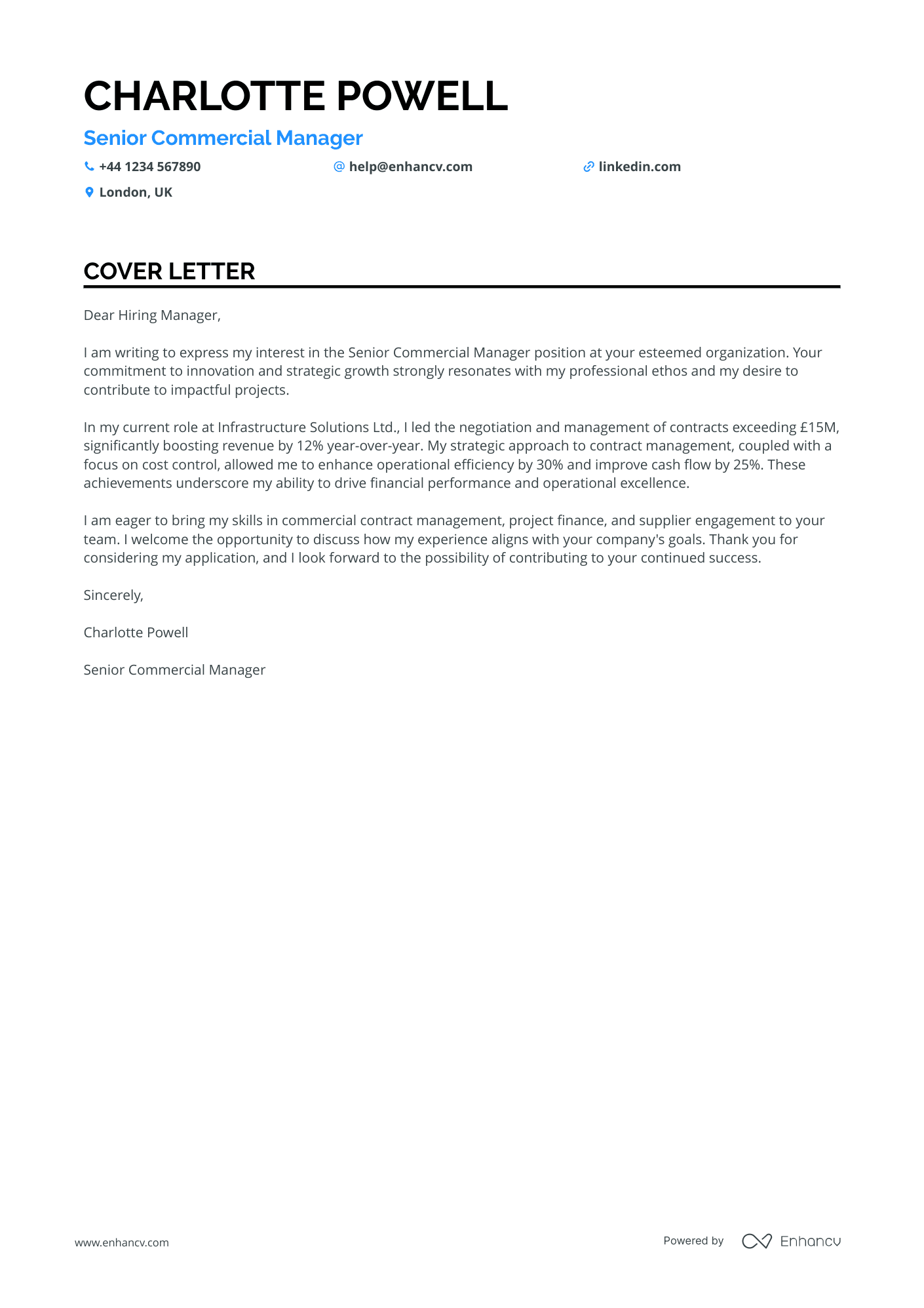When you start applying for jobs, you quickly realise that including a cover letter with your CV is a excellent way to stand out. But what should your cover letter focus on?
Should it emphasise your key achievements or simply list your responsibilities? And how can you effectively demonstrate that you're the ideal fit for the role?
One of the most common mistakes candidates make is either underselling themselves or overstating their experience.
In this guide, you’ll learn how to craft a compelling cover letter by showcasing your most significant professional achievement and telling the story behind it.
Commercial Manager cover letter example
Charlotte Powell
London, UK
+44 1234 567890
help@enhancv.com
- Quantifiable Achievements: Clearly demonstrate impact by quantifying achievements, such as leading negotiations of high-value contracts and boosting revenue and operational efficiency. This type of detail is crucial for a Senior Commercial Manager role to show measurable results.
- Role-Specific Expertise: Highlight specific skills related to cost control, contract management, and financial performance, which are essential for senior-level roles in commercial management.
- Alignment with Company Goals: Express a clear connection with the company’s mission or values, showing that you’ve done your research and see a symbiotic relationship between your professional goals and the company’s objectives.
- Focus on Strategic Growth: Emphasize experience in strategic growth initiatives, which demonstrate a forward-thinking approach necessary for a leadership position in commercial management.
Importance of cover letters in the United Kingdom
A well-crafted cover letter can significantly strengthen your job application by emphasising why you’re an ideal fit.
Here are some reasons why it matters:
- Personalisation: Employers expect your cover letter to demonstrate how your skills and experience align with the company’s needs and/or values.
- Addresses what is omitted from your CV: If your career path includes gaps or changes, your cover letter is the best place to address these positively and explain their relevance.
- Opportunity to stand out: Many applicants have similar qualifications, so a tailored cover letter can show your unique attributes and experience.
What UK employers expect from a cover letter
When writing your cover letter for a UK employer, it’s important to keep several things in mind. First, you need to conduct a thorough research, which includes reading up on the company’s website, recent news, and their presence on social media. Understanding the company’s latest achievements and its overall mission will allow you to tailor your letter to their specific needs.
Next, focus on the company’s core values. Whether they value teamwork, innovation, or community involvement, highlighting how your own experience aligns with these principles is essential.
Finally, don’t forget to match your skills to the job’s requirements. Study the job description carefully and pick out the most important qualifications or competencies. Then, provide evidence of how you meet those criteria with concrete examples from your past work experience.
How to format a commercial manager cover letter
Your cover letter is your opportunity to make a strong impression, so its structure must be professional and clear.
Here's an overview of how a UK cover letter should be structured:
- Begin with your address and contact details at the top.
- Include the employer’s name and address directly below.
- Add the date to the left or right of the page.
- Use an appropriate greeting, such as 'Dear Mr Smith' or 'Dear Sir/Madam.'
- Open with a strong introductory paragraph.
- Develop your points in the middle paragraphs, focusing on relevant skills and experience.
- Close with a concise conclusion, reiterating your interest and suitability for the role.
- Sign off formally with your name and signature.
The software used to match your profile to the job, Applicant Tracking Systems (ATS), won’t scan your cover letter. Instead, the cover letter reads as a more personalised note to the recruiter.
When it comes to choosing a font, consider modern options like Lato, Rubik, or Chivo, which should also be applied to your CV to maintain a consistent appearance.
Additionally, your cover letter should be single-spaced with 1-inch (2.5 cm) margins on all sides (our templates are pre-set with these specifications so you can focus on your cover letter content).
Finally, always send your cover letter as a PDF to preserve the formatting and prevent edits.
How to write your commercial manager cover letter salutation
First impressions often start with the greeting and in the case of your job application, 'Dear Sir or Madam' simply won't suffice.
Find out who’s hiring for the role—by calling or emailing the company, searching online, or using LinkedIn—and address them correctly.
Generally, you should address them by their surname (e.g., 'Dear Mrs Weasley'), but if you've spoken to them before, you might use their first name (e.g., 'Dear Albus').
How to write your commercial manager cover letter intro
It's never a bad time to show enthusiasm about the role, company, or team in your cover letter introduction.
Begin by sharing one or two aspects that genuinely excite you about the position—whether it's the company culture, specific responsibilities, or the team's past achievements.
Your enthusiasm demonstrates that you'll bring a strong work ethic, are eager to contribute, and are motivated to succeed.
How to write your commercial manager cover letter body
You’ve personalised your greeting and introduction—now it’s time to focus on writing the body of your cover letter.
Instead of listing off skills and responsibilities from your CV, focus on one career highlight that’s relevant to the role.
Use your hard and soft skills, success metrics (e.g., percentages or sales figures), and the long-term impact it had on the company.
A concise, well-told story centred on your value as a candidate will make a strong impression.
How to write a closing paragraph
You’ve written a brilliant cover letter so far—so don’t undermine it at the very end.
If you think signing off with a polite 'Kind regards' or 'I look forward to hearing from you' will make a strong impression, think again.
A better approach is to make a tangible promise—one that reflects both personal and professional growth—and demonstrates your value to the recruiters.
Alternatively, encourage the hiring managers by asking when you might expect to hear back from them.
Conclusion
Creating a compelling cover letter is vital in making a positive first impression on potential employers. Personalise your letter by addressing the hiring manager directly and ensuring your skills align with the job description.
Highlight specific achievements that demonstrate your suitability for the role, and express genuine enthusiasm for the opportunity. Finally, maintain a professional format that complements your CV for a cohesive application.




